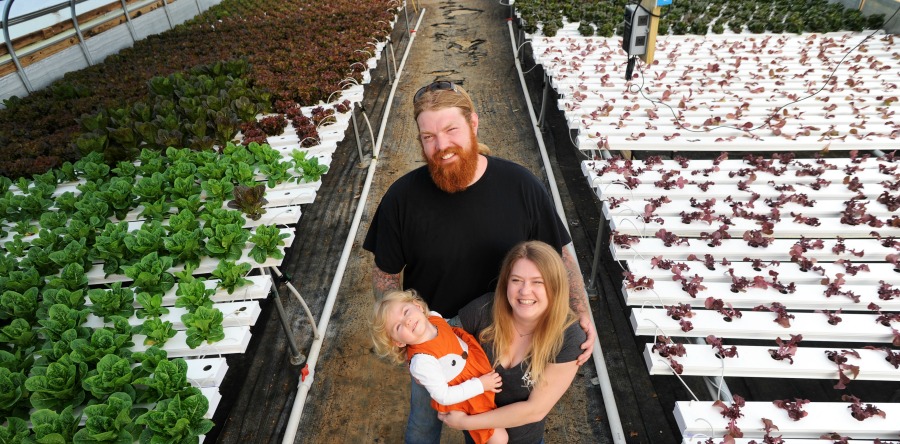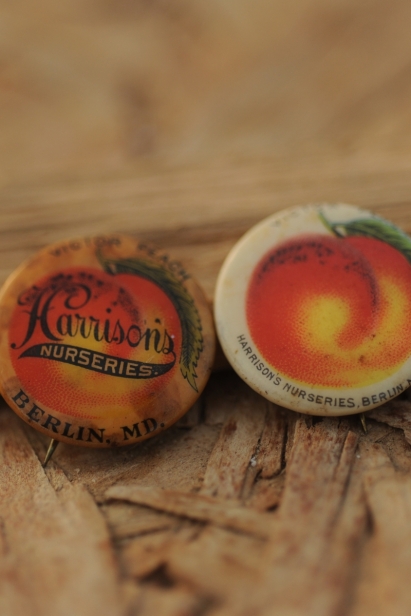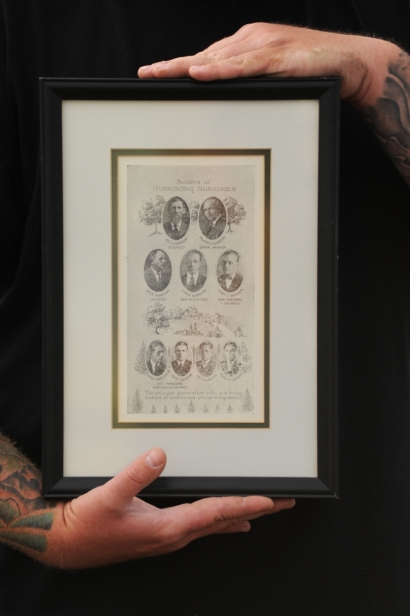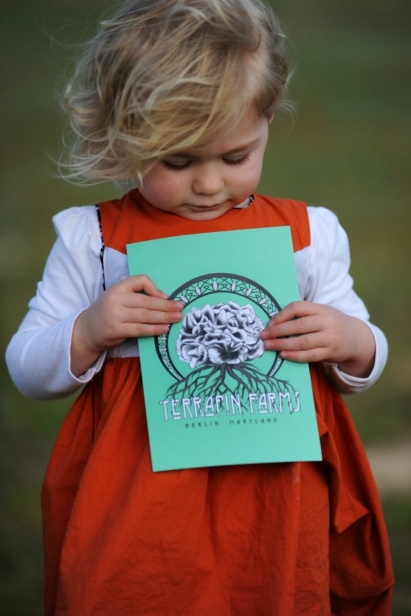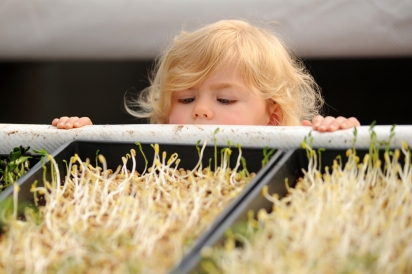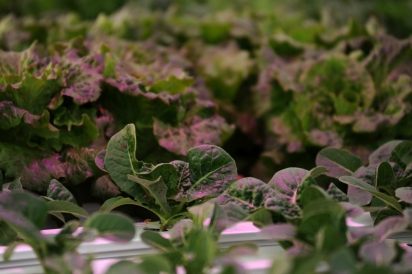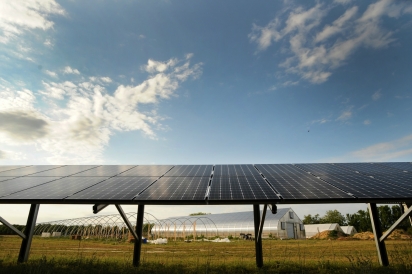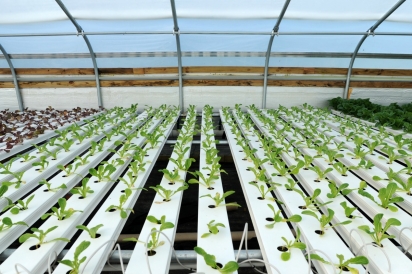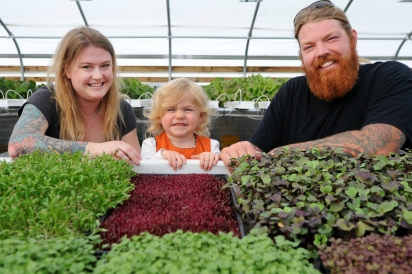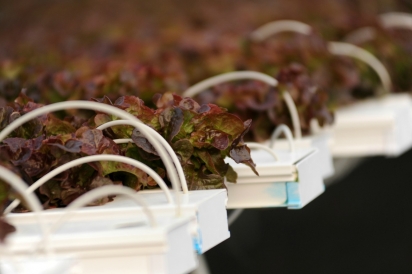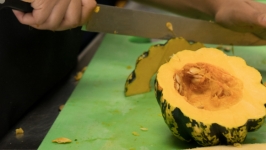Roots and Wings: Terrapin Farms Hydroponics
Tradition meets innovation as the Eastern Shore's Harrision family constructs a bright future in hydroponics.
It was nearly noon. I had made good time, and my old Mazda handled the long, winding excursion from Philadelphia to the end of South Point Drive like a champ. As I looked for the farm, I cut the radio to concentrate on mailbox numbers, as if turning it down would help me read.
Terrapin Farms was tucked away on the outskirts of Berlin, Maryland, practically hidden behind rows of blooming azalea bushes and mulberry trees. I pulled into the drive and sent loose gravel flying. The property’s driveway forked; one path led to greenhouses and the other to a newly renovated farmhouse. The mile-long path to the house was lined with trees and I couldn’t help but think that even Scarlett O’Hara would have been impressed.
Outside the greenhouses, a tall, burly man greeted me. He had long blonde hair and tattoos that wrapped around each arm. He didn’t look like a traditional farmer, but I already knew Johnny Harrison was a far cry from traditional.
Harrison grows his crops inside climate controlled greenhouses using hydroponics. Or more specifically, by using an intricate nutrient film technique. The main advantage of this system over other forms of hydroponics is that the plant roots are exposed to adequate supplies of water, oxygen and nutrients.
“It’s pretty rad,” Harrison said, adding that the bulbs are planted in watertight gullies, known as channels. The nutrient solution flows through the channels in a thin film over the roots, ensuring that they are watered and fed but not completely soaked. The thin film also ensures that the upper part of the roots will remain dry and have plenty of access to oxygen in the air.
As Harrison stood in the middle of the greenhouse, he inspected a baby lettuce plant. “I truly believe this is the future of farming,” he said.
Aside from his southern-rock persona, hydroponics and Harrison feel like a natural fit. It’s hard to believe the sixth-generation farmer grew up with other dreams.
LEGACY
Johnny Harrison learned about hard work early on. Turns out, it runs in the family.
It all started with his great-great grandfather, Orlando, who began studying new techniques for grafting and growing fruit trees at a young age. His intellect and savvy business sense made the family one of the most successful in Worcester County history. Harrison's farms and nurseries grew a variety of fruit trees and ornamental shrubbery, but were best known for their peaches.
“Orlando Harrison played an integral part in Berlin’s history,” said Gee Williams, Mayor of Berlin. “For more than 40 years, Orlando paid the highest of wages in Worcester County.”
The family dominated the U.S. peach market, and at one time were the largest grower and distributor in the world, he said, until a devastating blight in the 1960s destroyed the orchards. Most of their assets were lost, but Orlando’s son, G. Hale Harrison, had luckily begun to invest in the hospitality industry in Ocean City. He built the Harrison Hall Hotel in the 1950s as a gift to his wife Lois. After he died, Lois took over and guided her sons’ success in the industry.
Just barely in their 20s, Lois’ two sons purchased the Plim Plaza Hotel, which today serves as the headquarters of The Harrison Group that operates 10 oceanfront resort hotels and 12 restaurants.
SHIFTING GEARS
Growing up, Johnny was either working in one of his father’s restaurants or out in the field.
With a green thumb and a passion for cooking, he and his then-girlfriend-now-wife Ashley moved to California. It was there that the couple learned about hydroponics and its power to change the face of farming. They later moved to the Catskills of New York so Johnny could attend the Culinary Institute of America. They intended to move back to the Shore and open a restaurant of their own, but the longer they spent in the city, the more their plans began to change.
“We were seeing first-hand the farm-to-table movement becoming a ‘thing,’ ” Ashley Harrison said. “People were taking risks. The most successful restaurants in New York City were sourcing entire menus from local farmers and growers, and were willing to pay top dollar for it.”
Such a luxury was scarce on Delmarva and the couple decided they wanted to fill the void. They moved back to Maryland in 2014 and built a farm on the same property Harrison grew up on.
“We realized we could put the restaurant dream on hold, and instead, grow and source to local restaurants using hydroponics,” Johnny Harrison said.
FARMING FOR THE FUTURE
Unlike traditional farming, which is affected by the seasons and the whims of Mother Nature, hydroponics works under controlled circumstances.
As long as Harrison can maintain key factors like water circulation, pH levels, and the temperature within the greenhouse, he can grow coveted items such as lettuce, micro greens, radishes, tomatoes and edible flowers, year-round. He can also produce more than twenty times the amount he would be able to grow through traditional methods. Now in its third year, Terrapin Farms distributes produce to dozens of restaurants across Delmarva including Shark on the Harbor, Mother’s Cantina, 32 Palm and Pico Taqueria in Chincoteague.
“I always thought I’d follow in the family’s footsteps,” Johnny Harrison said. “I just never thought it would be with farming. Futuristic farming, sure.”
During the busy season, a typical day starts with several cups of coffee followed by system maintenance and harvesting. The Terrapin Farms team - Johnny and Ashley Harrison, Richard Lehman and Matt Smith - put orders together in the early morning hours.
“If we wait too long, the heat will make everything wilt,” Richard Lehman said.
While the team hustles through sunrise, they spend their afternoons building more greenhouses. Harrison hopes all of the long hours will pay off in a big way. Since taking over as the brains and brawn of Terrapin Farms, ditching the tractor for hydroponics isn’t the only change he’s implemented. The Berlin farm is now solar powered, organic certified and good agricultural practices (GAP) certified. The Harrisons and Terrapin Farms are also one of 40 farms looking to create a Delmarva Farmers Union, which aims to help local farms collaborate and support one another.
“Sustainability is extremely important to us here,” he said. “Traditional farming practices are taxing the country’s wallet and economy. We’re just trying to be part of that positive change for the future.” And Terrapin Farms isn’t the only farm challenging tradition.
Bob Murphy's Double Trouble Farms in Rhodesdale is repurposing chicken manure. The Maryland Department of Agriculture and agri-tech company Biomass Heating Solutions Limited have committed nearly $3 million toward manure-to-energy technology that they hope will significantly reduce the impact of Murphy's chickens — and one day perhaps all of Eastern Shore poultry — on the Chesapeake Bay.
In Selbyville, Cindy Stevens and C.J. Mears are paving the way for local aquaponic farming. In comparison to the nutrient film technique Harrison uses, aquaponics is the marriage of aquaculture and hydroponics that results in fish and plants growing together in one integrated system. They now have more than 3,000 heads of lettuce growing in their greenhouse.
"We call it our little science project," Stevens said.
ROOTS
Johnny Harrison picked up a baby pea shoot. “You see this,” he said, pointing to the dangling roots. “The length is a good sign. This little guy will be ready in a week or so.”
He put the pod back into its slot and wrapped an arm around his wife. Ashley Harrison is practically a foot shorter than her husband, but the two looked like they belonged together. I jotted the observation down and smiled to myself.
I stayed longer than I needed to, eagerly discussing sustainability, the miraculous discovery of coffee, the future of farming and their young daughter Cassidy. They hope she’ll carry on the family tradition and so far, things are looking favorable.
“She likes to help us,” Ashley Harrison said. “I’d like to think we’re giving her a magical childhood; she gets to run around the greenhouses like a fairy.”
Between play dates, filling orders, harvesting and expanding operations at the farm, Johnny and Ashley hardly have a minute to rest. They have no idea what the future will bring, but assure me there’s beauty in the unknown.
“My great great-grandfather was a pioneer,” he said. “He took nothing and made it into a booming business. And then my grandfather did the same thing with something else. I have no idea where hydroponics will take us, but I’d like to believe it’s going to get us to a better place for future generations.”
For more about what's happening at Terrapin Farms, visit them on Facebook.


